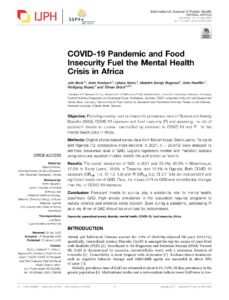Objective
Providing country-level estimates for prevalence rates of Generalized Anxiety Disorder (GAD), COVID-19 exposure and food insecurity (FI) and assessing the role of persistent threats to survival—exemplified by exposure to COVID-19 and FI—for the mental health crisis in Africa.
Methods
Original phone-based survey data from Mozambique, Sierra Leone, Tanzania and Uganda (12 consecutive cross-sections in 2021; n = 23,943) were analyzed to estimate prevalence rates of GAD. Logistic regression models and mediation analysis using structural equation models identify risk and protective factors.
Results
The overall prevalence of GAD in 2021 was 23.3%; 40.2% in Mozambique, 17.0% in Sierra Leone, 18.0% in Tanzania, and 19.1% in Uganda. Both COVID-19 exposure (ORadj. 1.4; CI 1.3–1.6) and FI (ORadj 3.2; CI 2.7–3.8) are independent and significant predictors of GAD. Thus, the impact of FI on GAD was considerably stronger than that of COVID-19 exposure.
Conclusion
Persistent threats to survival play a substantial role for mental health, specifically GAD. High anxiety prevalence in the population requires programs to reduce violence and enhance social support. Even during a pandemic, addressing FI as a key driver of GAD should be prioritized by policymakers.
Publication Details
- Year of Publication: 2024
- Region/s: Sub-Saharan Africa
- Theme/s: Human Development · Micro-Data Collection
- Research Topic/s: Food Security & Nutrition · Health
- DOI: https://doi.org/10.3389/ijph.2023.1606369







